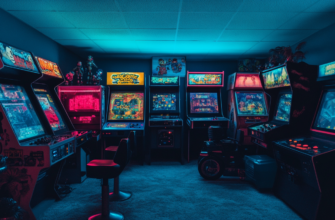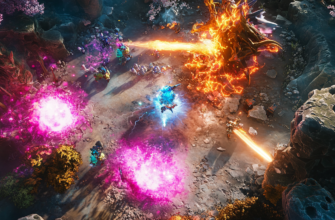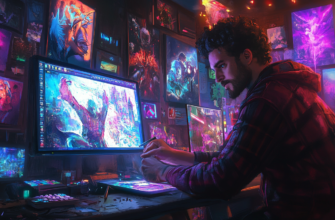“`html
- The irresistible allure of gaming: why we gravitate towards virtual worlds
- Understanding why virtual worlds capture our attention
- 1. Escaping reality
- 2. Sense of control
- 3. Achievement and progression
- 4. Social connections
- 5. The thrill of competition
- 6. Immersion and storytelling
- How developers enhance your gaming experience
- The role of feedback loops
- Adaptive difficulty and flow state
- How to balance gaming and real life
- 1. Set time limits
- 2. Create a “gaming-life” schedule
- Conclusion: Why the pull of virtual worlds is undeniable
- Want more tips?
The irresistible allure of gaming: why we gravitate towards virtual worlds
Hey bro, ever wondered why gaming has become such a universal obsession? Whether it’s the immersive universe of open-world RPGs or the adrenaline rush of high-stakes FPS matches, digital realms have a unique ability to reel us in for hours on end. And let’s be honest: we’ve all dived into virtual worlds and lost track of time. But what’s really going on in our brains when we play? The answer, as it turns out, can be found in the psychology of gaming. So, let’s unpack the science behind this and explore why so many of us are irresistibly attracted to these virtual worlds.
Understanding why virtual worlds capture our attention
The basic premise of gaming’s appeal always goes deeper than just fun or excitement. There are specific psychological triggers that make these worlds SO addictive. Let’s break it down, step by step, and think of how these factors weave together to catch—and keep—our interest.
1. Escaping reality
One of the biggest draws of gaming is the chance it gives us to escape reality. Whether you’ve had a hard day at work or school, or you’re just looking for a change of pace, booting up a game can transport you somewhere new and exciting. In a nutshell, gaming offers a way to momentarily forget the pressures of everyday life.
Example: Ever felt like your job or classes were stressing you out? Escaping to the vast fields of “The Witcher 3” or the shooting ranges of “Call of Duty” may provide that crucial mental reset.
2. Sense of control
In real life, things often feel beyond our control—which can understandably be stressful. In video games, however, players are given a heightened sense of agency and control. You make key decisions that impact the outcome of the game, impacting your virtual success. This can be a nice contrast to the randomness of the outside world.
Tip: Games that offer branching narratives like “Mass Effect” excel at giving the player the power to shape their world. It’s *your* choice how the story goes—and, for many, that feeling is highly satisfying.
3. Achievement and progression
Humans naturally seek out goals and love providing themselves with the sense of progression. Gaming scratches this itch in a major way. A well-designed game sucks us in with frequent rewards—whether through XP, achievements, or new gear upgrades.
- Leveling up a character in an RPG gives you that “pat on the back.”
- Unlocking special items or skills signals progress.
Check out how addictive the reward loops in games like “Destiny 2” keep players hooked, always aiming for the next achievement!
4. Social connections
Surprisingly, many gamers play for more than just the game mechanics. Social interaction is HUGE in online gaming. Whether it’s hopping onto Discord for some friendly banter or teaming up for a raid in World of Warcraft, these interactions can help us feel part of something larger, adding a new dynamic to the gaming experience.
Fact: A 2020 study revealed that more than 35% of gamers primarily play to socialize with friends online. Those late-night PUBG or Apex Legends squad matches? They’re as much about bonding with others as they are about the win!
5. The thrill of competition
What’s more exhilarating than the moment right before a match begins? For a lot of us, that sense of competition—whether against other players or yourself—works like a natural dopamine boost.
Example: In a game like “League of Legends” or “Overwatch,” the stakes are high and your actions determine whether you win or lose. That’s intense—but in the best way possible.
6. Immersion and storytelling
Let’s not forget about the simple joy of storytelling. Games these days are often incredibly rich narratives, allowing you to explore worlds and see yourself as part of something much bigger. Whether you’re saving a kingdom or discovering ancient mysteries, games offer stories that we can be a part of. This leads to an immersive experience that can be even more captivating than your favorite Netflix series.
How developers enhance your gaming experience
If you think the pull of gaming is accidental, think again, bro. Game developers use all sorts of psychological tricks to make their worlds captivating and keep you coming back for more.
The role of feedback loops
Let’s talk about positive feedback loops. In the simplest terms, this is when the game rewards you with a pat on the back every time you accomplish something. These little rewards may feel small, but they’re massive in encouraging you to keep going.
- For example, many MMOs reward you with loot for even the simplest tasks, pushing you subtly to complete just that one more quest.
- In competitive games, climbing rankings offers that addictive sense of improvement.
Advice: Don’t fall into the trap of endless grinding just to feel accomplished. It helps to take a break and appreciate your progress—and hey, your real-life achievements are just as important.
Adaptive difficulty and flow state
Ever notice how games seem to adjust depending on how you’re doing? The better you play, the harder the game seems to get—that isn’t a coincidence. Many modern games feature adaptive difficulty designed to keep you in a flow state: a golden zone where the challenge feels just right—not too easy but not impossibly hard.
Games like “Dark Souls” have perfected this balance, creating an exhilarating sense of accomplishment when you finally overcome a difficult boss.
How to balance gaming and real life
Okay, pal, we’ve been over why gaming is so darn tempting, but how do you balance those epic gaming sessions with your everyday life? It’s important to avoid letting games take over too much of your time at the expense of real-world experiences.
1. Set time limits
Set daily time limits that allow you to enjoy your gaming without overindulging. Somewhere between 2 to 3 hours on weekdays can help you relax without over-committing. On weekends, hey, stretch it a bit if you need!
2. Create a “gaming-life” schedule
It may sound boring, but planning your gaming around other responsibilities ensures you stay productive. Whether it’s schoolwork, exercise, or catching up with friends IRL, balance is key.
Conclusion: Why the pull of virtual worlds is undeniable
So, to sum it all up: the psychology of gaming is a potent mix of escapism, control, achievement, competition, socialization, and storytelling. Game developers know how to bait us into their worlds using clever techniques like feedback loops and adaptive difficulty, creating an experience that’s hard to resist. While it’s awesome to get lost in these alternate realities, it’s also important to balance your gaming life with the real world.
Keep chasing those in-game achievements, but don’t forget to chase real-life ones too!
Want more tips?
If you’re keen on boosting your performance or finding more ways to optimize your gaming experience, check out some of my other blog posts and let’s continue this epic journey through the digital frontier together!
“`

















